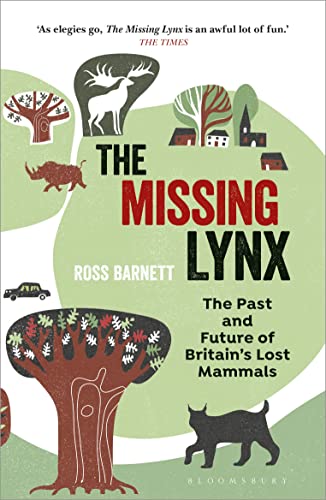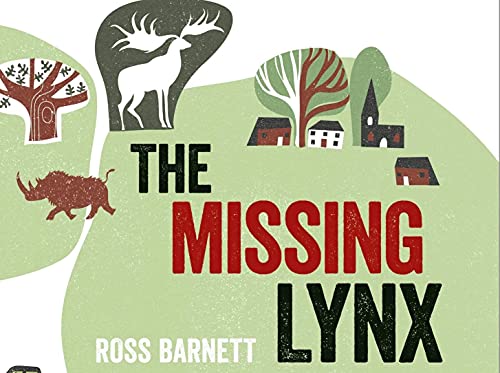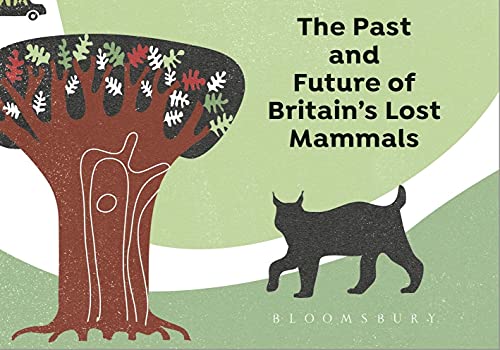



The Missing Lynx: The Past and Future of Britain's Lost Mammals
C**S
Definitive and entertaining study on the UK's lost megafauna
The missing Lynx by Ross Barnett is a superb book about the recent (in earth terms) and indeed current megafauna extinction, and basically how humans are to blame. It focuses on several species that used to live in the UK such as the cave hyena. I love my natural history so this book is right up my street. It's very accessible, and funny, as well as a very sobering read. The reintroduction of species is also very much in the news, so this is a very timely read.
L**K
A must read if we are to learn from past mistakes and create a better future for all living species
Wonderful book from start to finish. Anyone who is not a scientist need not worry about being bamboozled. It is well written in a language most will understand: explaining the fate of many animals, now extinct, what we as humans did to cause that and what we must learn in order to be able to live alongside or reintroduce some species. It is at times breathtakingly sad, at others very witty but not once does it fail to hold the reader’s attention. It is a book every person should read in order to allow us to learn to change our ways to stop the destruction of the habitats of many animals and allow some to come back to where they once lived. Hope for our future in a book!
J**N
Love this book
Ross Barnett's new book about extinct megafauna hits the spot in a number of ways. Barnett's love of and deep knowledge of these species is really apparent, and he is one of those rare writers who effortlessly brings you along with him in a romp through the Pleistocene and all its amazing creatures. It's a highly entertaining read, full of interesting stories, bringing to life the megafauna and the people who study them, there's stuff in there that you'll read out loud to people nearby, it's funny and it is really easy to read (staying up late to finish chapters kind of easy). It's a little book that makes a big impact, and I came away with a really enlarged appreciation of where we are as humans in terms of our impact on other animals. The chapter on mammoths broke my heart a bit. As these extinct animals and their stories gather pace, you start to see the present as a small point in time in the bigger continuum of the Anthropocene, and it changed my perspective about both extinction and biodiversity baselines. Stories about extinction and the challenges facing us and our planet can be difficult and sombre reading, but the sheer delight this book takes in the stories and biology of the animals that went before means that one can be simultaneously amazed, delighted, curious and sad. I learned a great deal from this book and could not recommend it more highly.
M**L
They lived here once, can we have them back?
I loved this book! It takes us in order of approximate time since extinction through all the mammalian megafauna for which there is fossil evidence that they once lived in Britain. There is enough information on the ecology of each species to understand how they lived and when/why they died out, both here and globally. It’s a sorry but should be well-known tale - fair cop, we did it, usually - though climate change may have helped (?) at times. It warms up though as the story nears the present, telling of animals that were certainly here in historical times and are even still extant elsewhere in the world. By this point we are looking at the possibility of reintroduction to GB. Sadly, and much as I’d personally love to see wolves and even bears back here, I have to concur that it’s very unlikely. But, given that we now have unofficial wild boar roaming around, and beavers poised to spread in several counties once the nod is given - why not the lynx too? Please, please?
M**E
If you like Bill Bryson and Stephen Fry...
Ross Barnett has a great combination of gifts: for writing, for comedy, and for communicating science. I have rarely learned so much while laughing so much. It reminds me of Bill Bryson and Stephen Fry – popular writers who are incredibly erudite. He shares their impeccable radar for telling the reader what's relevant and making previously arcane topics, er, topical. What was, for me, murky 'prehistory' has suddenly snapped into exciting focus.
J**N
A fabulously interesting read! I want to read it again already.
This is most definitely one of the best books I have ever read. There is a fair bit of scientific jargon but this is explained and the author describes everything in a fun and interesting way. I am no paleontologist or scientist, but I feel like I now have a good understanding of mammal life since the last ice age. It is clear that the UK has had some magnificent animals living on the land in days gone by and it is equally clear that humans have always killed and destroyed. Historically humans didn't know better, but now we do! Its time to learn the lessons and to protect and encourage what we have. Read this book, let your heart ache for what has gone, but feel the hope of a more balanced future. Definitely a book I will read again.
C**T
The missing lynx is a much needed link to our past biodiversity
This new book by @DeepFriedDNA (twitter handle) is a must-read for anyone interested in the fate of our faunal history. If you've ever read Ross's posts on twilightbeasts.org blog you'll know he is a science communicator extraordinaire. As a kid I had little sense of the scale of time and didn't really distinguish between the time of the dinosaurs and the time of mammoths, woolly rhino etc. Working in the ancient DNA field changed all that - the loss of these species feels very fresh. This sense off recent loss is all the more tangible from reading this book. It makes me wonder how the next generation will feel about the species we'll continue to lose in our life time. Highly recommended read for all age groups and for scientists and non-scientists alike.
Trustpilot
1 month ago
2 months ago